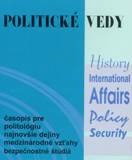Faktory kooperácie v medzinárodných vzťahoch a problémy medzinárodných organizácií
Factors of Co-operation in International Relations and Problems of International Organizations
Author(s): Tomáš ProfantSubject(s): Politics / Political Sciences
Published by: Univerzita Mateja Bela
Keywords: international relations; international organizations; co-operation; factors; problems
Summary/Abstract: Up to present time the world politics has been based on not-fully-known principles. One of them being generally respected by neo/liberalism and neo-realism is the existence of the anarchy in international relations. Its impact on the behavior of individual states is different. However, both neo-liberals (having in mind neo-liberal institutionalists) as well as neo-realist acknowledge and admit that it presupposes co-operation among the main actors of the world politics. It seems that while the Cold War period was more convenient for the realistic preconditions, the period after the fall of the Berlin Wall was more relevant and proper for the neo-liberal institutionalism, excluding only some occasional and intermittent empirical researches providing the opposite evidence. Nevertheless, it was inevitable to adapt and modify it to co-operation and to come back again to originally rejected factors of co-operation not only to relative profi ts. At the same time it is important to examine and explore the operation of international institutions which were originally considered to be the fundamental device of the improvement of co-operation, but they might become a double-edged weapon.
Journal: Politické vedy
- Issue Year: 10/2007
- Issue No: 1-2
- Page Range: 59-74
- Page Count: 16
- Language: Slovak

